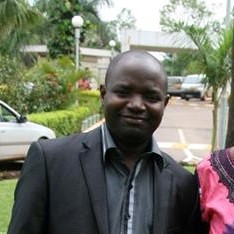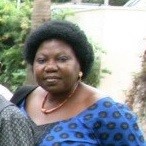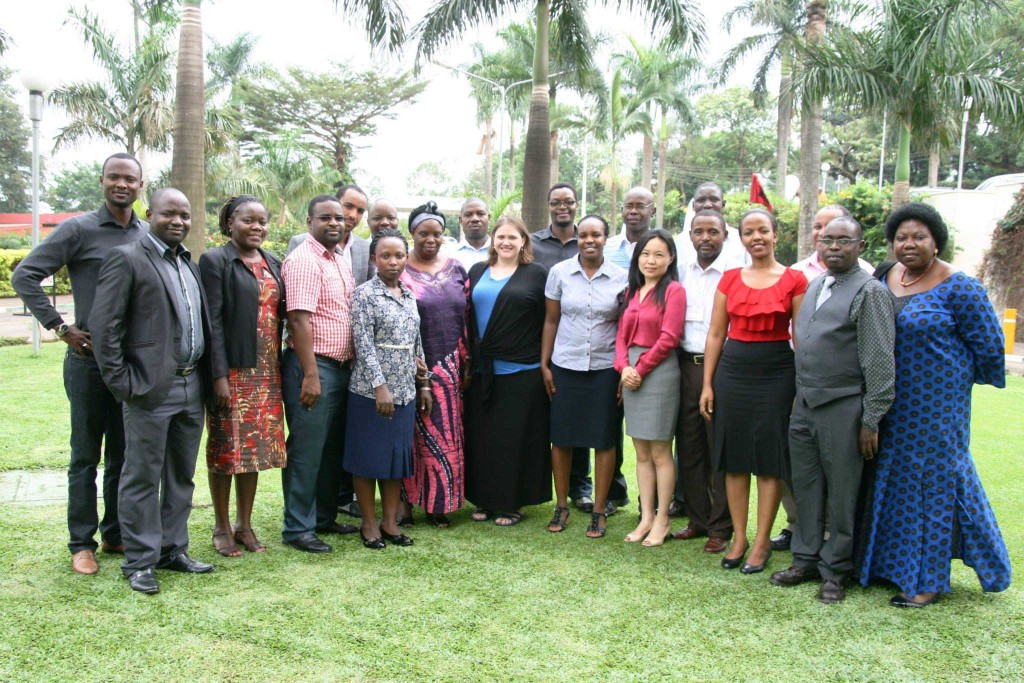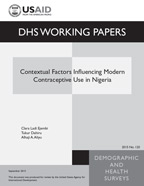Three Perspectives on the DHS Fellows Program from 2015 Fellows
The DHS Fellows Program brings participants together to strengthen their individual analytical skills and to sustainably increase their university’s capacity for using DHS data. As this year’s Fellows Program drew to a close we asked three Fellows, Allen Kabagenyi (Makerere University), Simona Joseph Simona (University of Zambia), and Clara Ladi Ejembi (Ahmadu Bello University), to reflect on their experience with the Fellows Program and with DHS data.
Overall Fellows Program and workshops
Simona: The 2015 DHS fellowship brought together five wonderful three-member teams from Nigeria, Tanzania, Uganda and Zambia. I was a member of a team of participants from the Department of Social Development Studies at the University of Zambia.
Allen: Participants came from diverse backgrounds including: social sciences, medicine, statistics, demography and epidemiology.
Clara: The fellowship program comprised of two workshops and activities we undertook in-country in our institutions. Over the course of the two workshops, facilitated by two very amiable DHS staff and co-facilitated by three previous DHS Fellows, we were given hands-on training on the use of the DHS data in our research work.
Allen: During the first workshop in Kampala, Uganda, we were introduced to the capacity building program, DHS questionnaires, sampling and weighting, online tools, data structure and files among others. Furthermore, we learnt about The DHS Program, what they do, the coverage, target population and mandate.
A subsequent workshop was held in Zambia, where participants learnt about estimation of maternal, infant and child mortality using DHS data and Service Provision Assessment (SPA) tools. During the trainings, we were accorded a chance to present our projects and developed publishable DHS working papers with support from the DHS technical team.
Our achievements
Clara: We sent an abstract which was accepted for presentation at the forthcoming International Conference on Family Planning in Indonesia. We also secured approval for presentation of our research work at the forthcoming national conference of the Association of Public Health Physicians of Nigeria.
Allen: Results from our DHS-research fellowship will be presented in the forthcoming International Conference on Family Planning in Indonesia. It is an honor to have an oral presentation to stakeholders and professionals in the field of reproductive health. Our manuscript is ready for journal submission we are looking forward to having it published.
Simona: We are in the process of editing our paper for the targeted peer reviewed journal. We are also exploring a few other topics and collaborations with a view of preparing more papers and publications based on the DHS dataset.
Capacity strengthening at our university
Allen: Given the number of DHS fellows at Makerere University, plans are underway at the School of Statistics to have DHS data utilization integrated in teaching and research. At the department, there are on-going research projects based on DHS data from colleagues with some manuscripts submitted for review and publication. Masters students at the School of Public Health – Makerere University were excited and showed interest in future use.
Clara: At Ahmadu Bello University, we have been able to sensitize the university management and the university faculty on use of DHS data for teaching and research; and also on the fellowship program so that hopefully, more teams will apply from our institution this year. We have started the process of integrating DHS into our lectures in demography and statistics in the department.
Simona: I am happy to see that our participation in the DHS fellowship is already beginning to impact positively on our colleagues and students in our department through the capacity building plans we have started implementing. It is gratifying to see the level of enthusiasm among colleagues and students regarding the potential of the DHS data. I am positive that going forward, the DHS data will be integrated in our teaching and research activities and eventually yield many more publications.
Benefits of the Fellows Program
Simona: It was fulfilling to see the development of our paper as the Zambian team. The process of preparing it under the guidance of facilitators from The DHS Program and the co-facilitators was rigorous and yet empowering. We have acquired skills that will obviously be invaluable in our careers beyond the DHS fellowship.
Allen: The benefits of the program are countless from learning about The DHS Program, to acquiring skills in data analysis, appreciating the use of DHS data, networking and sharing information. Discussing country specific problems increased our understanding about other countries in the region.
Final words
Allen: It’s no doubt that I would recommend other people to participate in this fellowship as it is one of the best capacity building programs for teaching staff in strengthening their analytical and data utilization skills.
Simona: Personally, the DHS fellowship has been nothing short of inspirational and I am sure that the DHS data will form an integral part of my scholarship henceforth. I would urge eligible scholars in the coming years to grab the opportunity provided by the DHS fellowship.
Clara: Thank you very much DHS, for the opportunity to participate in one of the most enriching training programs I have undertaken in a long time.
We applaud all the 2015 DHS Fellows for their hard work and achievements! Be sure to read their papers, the final products from the 2015 DHS Fellows Program:
- Contextual Factors Influencing Modern Contraceptive Use in Nigeria
- Factors Associated with Changes in Uptake of HIV Testing among Young Women (age 15-24) in Tanzania from 2003 to 2012
- Gender Relations, Sexual Behaviour, and Risk of Contracting Sexually Transmitted Infections among Women in Union in Uganda
- Intimate Partner Violence (IPV) in Zambia: Sociodemographic Determinants and Association with Use of Maternal Health Care
- Predictors of Time to Contraceptive Use from Resumption of Sexual Intercourse after Birth among Women in Uganda
 Allen Kabagenyi is a THRiVE PhD fellow from Makerere University, School of Statistics and Planning in Collaboration with University of Cambridge-UK. Her PhD research seeks to understand the explanations for the persistent high fertility rates in Uganda and low use of contraception. She lectures in Department of Population studies, School of Statistics and Planning.
Allen Kabagenyi is a THRiVE PhD fellow from Makerere University, School of Statistics and Planning in Collaboration with University of Cambridge-UK. Her PhD research seeks to understand the explanations for the persistent high fertility rates in Uganda and low use of contraception. She lectures in Department of Population studies, School of Statistics and Planning.
 Simona Joseph Simona is a lecturer at the University of Zambia in the School of Humanities and Social Sciences. He was appointed lecturer after completing his master of research (M.Res) degree in sociology and research methods from the University of Glasgow in 2013. His areas of interest are mainly in sociology of health and illness, gender based violence and social science research methods.
Simona Joseph Simona is a lecturer at the University of Zambia in the School of Humanities and Social Sciences. He was appointed lecturer after completing his master of research (M.Res) degree in sociology and research methods from the University of Glasgow in 2013. His areas of interest are mainly in sociology of health and illness, gender based violence and social science research methods.
 Dr. Clara Ladi Ejembi is a Fellow of the Medical College of Public Health, and works as a Consultant Community Physician with the Ahmadu Bello University Teaching Hospital. Her areas of research and activism interests include reproductive health, maternal and child health, primary health care and HIV/AIDS and she has published in these areas.
Dr. Clara Ladi Ejembi is a Fellow of the Medical College of Public Health, and works as a Consultant Community Physician with the Ahmadu Bello University Teaching Hospital. Her areas of research and activism interests include reproductive health, maternal and child health, primary health care and HIV/AIDS and she has published in these areas.







Are the photos and bios of the authors flipped?
They are in correct order. We hope you enjoyed the post!